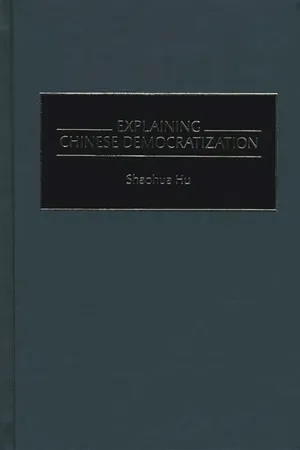
- 208 pages
- English
- PDF
- Available on iOS & Android
Explaining Chinese Democratization
About this book
Hu seeks to explain China's failure to establish a democratic system. He demonstrates both continuity and change in China's democratization process. Modern China regards power and wealth as primary goals and treats a strong state as a major means to these ends. Such a preference puts democracy on a back burner. Employing a theoretical framework which consists of five factors—historical legacies, local forces, the world system, socialist values, and economic development—Hu shows that, while all of these factors were at work in all eras, each assumes a special significance in a particular period. Traditional China before the 1911 Revolution attempted to adjust itself to a new, Western-dominated world. In the Republican era, the control of local forces topped the political agenda. Nationalist China sought to survive and develop in the world system, while Maoist China set for itself the task of building a socialist state. And, of course, economic development has been the priority of the Deng era. As Hu shows, these five factors have had determining impacts on the long struggle for democracy in China.
Tools to learn more effectively

Saving Books

Keyword Search

Annotating Text

Listen to it instead
Information
Table of contents
- Cover
- EXPLAINING CHINESE DEMOCRATIZATION
Frequently asked questions
- Essential is ideal for learners and professionals who enjoy exploring a wide range of subjects. Access the Essential Library with 800,000+ trusted titles and best-sellers across business, personal growth, and the humanities. Includes unlimited reading time and Standard Read Aloud voice.
- Complete: Perfect for advanced learners and researchers needing full, unrestricted access. Unlock 1.4M+ books across hundreds of subjects, including academic and specialized titles. The Complete Plan also includes advanced features like Premium Read Aloud and Research Assistant.
Please note we cannot support devices running on iOS 13 and Android 7 or earlier. Learn more about using the app